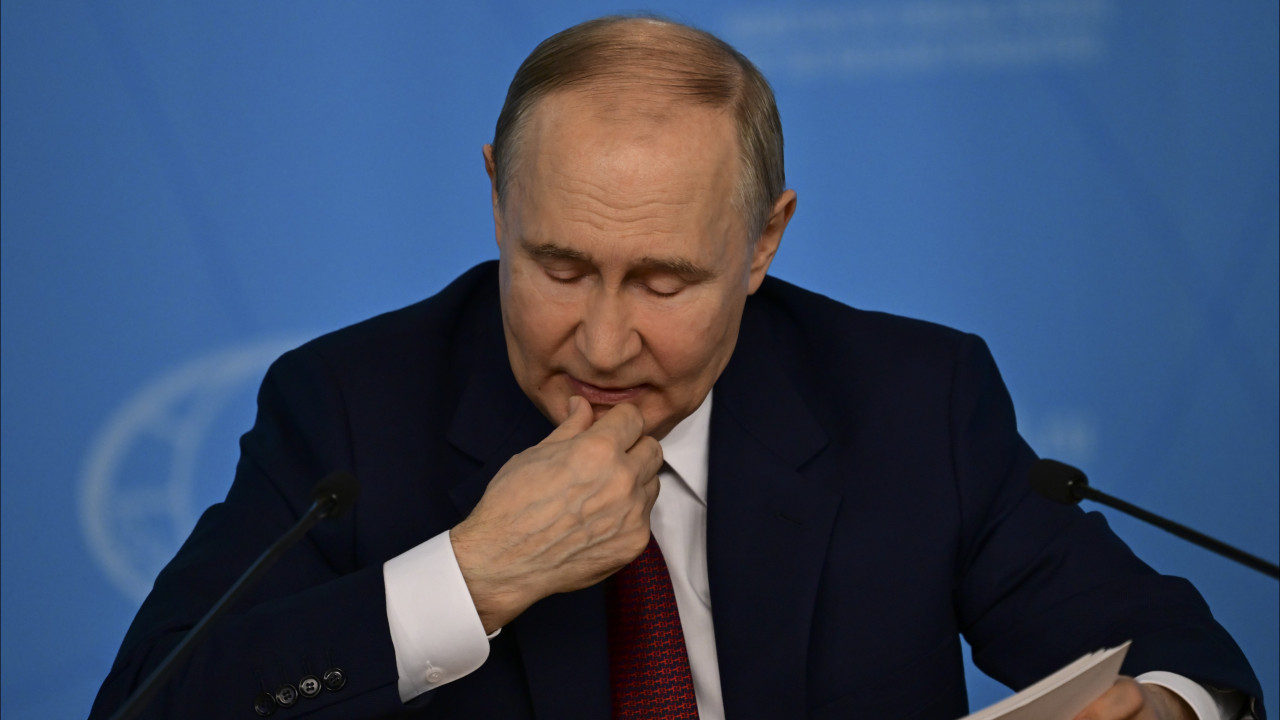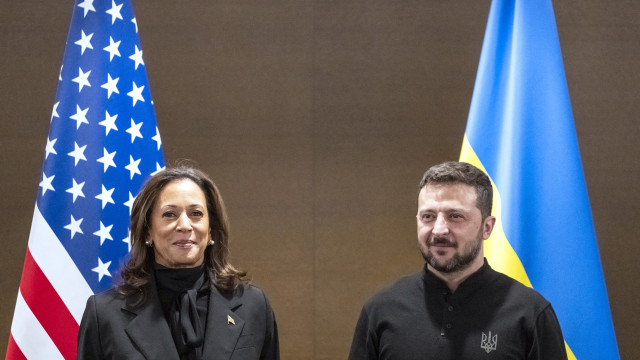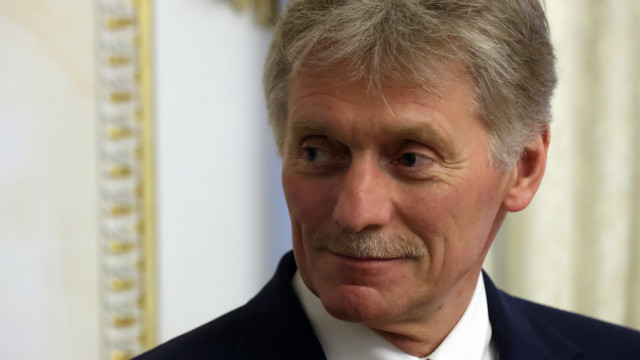
O Russian President Vladimir Putin promised a “ceasefire” in Ukraine if Kyiv began withdrawing its troops from regions annexed by Moscow and gave up its plans to join the transatlantic NATO alliance. The proposal was promptly criticized by the West, which considered it to be “unacceptable” as well as an “ultimatum”.
Speaking to Russian Foreign Ministry officials on Friday, Putin stated that “as soon as Kyiv (…) begins the effective withdrawal of troops [das regiões de Donetsk, Lugansk, Kherson e Zaporíjia] and notify that it is abandoning its plans to join NATO”, it would immediately “order to cease fire and begin negotiations”.
Putin’s proposal was not immediately commented on by Ukraine but, on his account on the social network X (Twitter), the advisor to the Ukrainian Presidency, Mykhailo Podolyak, considered it “contrary to common sense”.
“We must get rid of these illusions and stop taking Russia’s ‘proposals’ seriously, which are contrary to common sense.”, he stated. “There are no new peace proposals from Russia. The Putin entity has simply formulated the ‘standard aggressor package’ that we have heard many times before.”
There are no new “peace proposals” from #Russia. Entity Putin has voiced only the “standard aggressor’s set”, which has been heard many times already. Its content is quite specific, highly offensive to international law and speaks absolutely eloquently about the incapacity of the…
— Mykhailo Podolyak (@Podolyak_M) June 14, 2024
Ukrainian President Volodymyr Zelensky later described the proposal as an “ultimatum” embedded in the “new wave in Russian Nazism.” “What can we say about this ultimatum? It’s no different from others he’s made before”he stated, during the G7 summit in Italy.
This Saturday, during a speech at the Peace Summit in Ukraine, taking place in Switzerland, Zelensky argued that Putin “must change his record of ultimatums” and considered that “if Russia were interested in peace, there would be no war”.
The Secretary General of NATO also considered that the Putin’s proposal “was not made in good faith” and which is, on the contrary, in the sense of “more aggression” from Ukraine. “That is not a proposal for peace, it is just for more aggression, more occupation. It was not made in good faith”he declared at a press conference on Friday in Brussels.
The official also argued that “it is not Ukraine that has to withdraw troops from Ukrainian territory” and that the proposal “demonstrates that Russia’s only objective is to control Ukraine”.
For his part, the president of the European Council, Charles Michel, argued that “it will depend on Ukraine” to decide “when” a peace agreement with Russia will be possible, stressing that any agreement must respect the rules of International Law.
“This war has an aggressor, which is Russia, and a victim, which is Ukraine. The Ukrainian people have the right to defend their children, their homes and their cities”he also highlighted, in his speech at the Summit for Peace in Ukraine.
For the United States, White House National Security Council spokeswoman Adrienne Watson stressed on Friday that “there is no country in the world that can seriously say” that the proposal “is acceptable under the Charter of the UN, international law, basic morality or common sense” and accused Putin of putting a “price” on peace: the occupation of “even more Ukrainian territory”.
This Saturday, US Vice President Kamala Harris stated that Putin’s proposal it is not a negotiation, but rather “a surrender” of Kyiv to Russia’s “blatant violations” of the United Nations Charter.
“Yesterday, Putin presented a proposal, but we have to tell the truth: he is not calling for negotiations, he is calling for surrender. The United States is on Ukraine’s side, not out of charity, but because it is in our strategic interests”said Kamala Harris at the beginning of the first plenary session of the Ukraine Peace Summit.
Among other critics of the proposal are German Chancellor Olaf Scholz and the head of European Union (EU) diplomacy, Josep Borrell.
Borrell criticized the Russian president’s idea and considered that the aggressor “cannot dictate the conditions for a ceasefire”. “Putin’s unacceptable demands are intended to legitimize the invasion and undermine peace efforts as Russia strengthens itself and prepares for a long war. The aggressor cannot dictate the conditions for a ceasefire“, wrote Borrell on the social platform X, adding that “Russia’s constant aggression against Ukraine shows that [Moscovo] has no real interest in peace.”
Russia’s continued aggression against Ukraine shows no real interest in peace.
Putin’s unacceptable demands aim to legitimise the invasion and undermine peace efforts, while Russia rearms & prepares for a long war.
The aggressor cannot dictate the conditions for ceasefire.
1/2
— Josep Borrell Fontelles (@JosepBorrellF) June 15, 2024
In turn, the German Chancellor, Olaf Scholz, stated that at issue is a proposal that aims to create “a dictated peace”. “What we need is not a dictated peace, but a just and equitable peace, which takes into account the integrity and sovereignty of Ukraine”said the German leader in an interview with the television station ARD, cited by the agency France-Presse (AFP).
The Spanish Prime Minister, Pedro Sánchez, defended that the Summit for Peace in Ukraine should send Russia “a very clear message” that there are non-negotiable principles, namely respect for the sovereignty of a country.
“Any solution that validates aggression or violent annexation will not be sustainable, it will only lead to a more unstable and dangerous world”these.
British Prime Minister Rishi Sunak went further and urged Zelensky to present his peace conditions with Russia “from a position of strength”.
“From a position of strength, we must work with President Zelensky to establish the principles of a just and lasting peace, based on international law and the Charter of the United Nations”said at the Peace Summit.
Marcelo Rebelo de Sousa refuses to “comment” on the proposal
Here, the President of the Republic, Marcelo Rebelo de Sousa, excused, this Saturday, a comment on the ceasefire proposal presented by the Russian counterpart.
“I’m not going to comment on that. It would be doing the opposite of my presence here. Here the objective is to work for peace with patience, naturally reaffirming points of principle that are fundamental in the Portuguese position, but letting the rest of this conference unfold”considered the head of state, in statements to the press on the sidelines of the Summit for Peace in Ukraine.
Moscow regrets “unconstructive” response from the West
Kremlin spokesman Dmitry Peskov lamented the West’s response to the proposal, calling the reactions “unconstructive in nature.”
“We have seen a large number of official reactions, all of them of a non-constructive nature,” Peskov said, according to Europa Press, citing Russian news agency TASS.
The proposal comes at a time when the Peace Summit in Ukraine is taking place in Switzerland. China, one of Moscow’s great allies and seen as a key intermediary for future peace talks, rejected participating in the summit given Russia’s absence, with Zelensky accusing Beijing of working together with the Kremlin to sabotage the conference by pressuring countries to not participate.
The objective of the meeting, organized by Switzerland following a request to that effect from the Ukrainian president, is to “inspire a future peace process”, based on “the debates that have taken place in recent months, namely the Ukrainian peace plan and other peace proposals based on the Charter of the United Nations and the fundamental principles of international law”.
Read Also: Tensions in Ukraine “could tomorrow extend to East Asia”

Download our free App.
Eighth consecutive year Consumer Choice for Online Press and elected product of the year 2024.
* Study by e Netsonda, Nov. and ten. 2023 product of the year – pt.com
Source: https://www.noticiasaominuto.com/mundo/2580824/ultimato-e-aceitavel-o-que-se-diz-sobre-a-proposta-de-paz-de-putin




